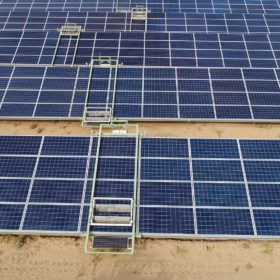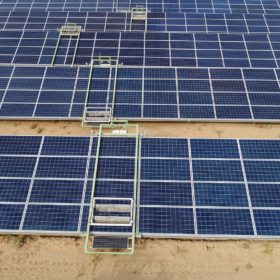Covid-19 impact: Acme Solar abandons India’s record-low PV tariff project

The developer has decided to cancel the power purchase agreement for the 600 MW project that it won at a tariff of Rs 2.44/kWh as it fears commissioning to stretch beyond a 6-month extension from the scheduled date.
Acme Solar, which won a 600 MW project in Rajasthan at the lowest ever Indian PV tariff, has decided to abandon it. The project was bagged in 2018 at a tariff of Rs 2.44 per kWh in a reverse auction conducted by tendering agency Solar Energy Corporation of India (SECI).
The developer has moved to the Central Electricity Regulatory Commission (CERC) seeking directions to prevent SECI and Power Grid Corporation of India Limited from encashing bank guarantees and letters of comfort submitted.
In its petition, the developer submitted its decision to terminate the PPAs executed with the SECI citing its inability to commission the project within the timeline due to supply chain disruptions caused by Covid-19 outbreak and the delays in getting land for the substation and commissioning of associated transmission network elements.
“The petitioners [Acme Solar] have terminated the PPAs dated 7.12.2018 executed with SECI on account of the force majeure events, namely, status quo orders by Rajasthan High Court qua land on which Fatehgarh Substation was to be constructed, outbreak of Covid-19 and its adverse impact on manufacturing facilities of suppliers since December 2019 including lockdown in China and India, and delay in commissioning of associated transmission network elements by other transmission service providers”—Acme Solar said in its petition.
Acme submitted the projects have already been delayed by 15 months on account of the above factors and further delay will continue due to Covid-19 induced uncertainty.
“The PPAs entered with SECI provide for a maximum extension of 6 months from scheduled commissioning date, i.e., total 30 months from the effective date of the PPAs, for commissioning the entire capacity of the projects due to any reason whatsoever. Therefore, the entire capacity of the projects is required to be commissioned by 8.5.2021, considering an extension of 6 months from the scheduled commissioning date of 8.11.2020. The PPAs do not permit any extension beyond this point for any reason”—the petition read.
“Due to delay on account of force majeure events, the petitioner cannot execute the projects within the time. Accordingly, the performance of obligations under the PPAs has become impossible and thus become void. Therefore, the parties are absolved from their obligations.”
SECI, however, has not accepted the unilateral termination of the contract by Acme on alleged grounds of force majeure. It has disputed that there has been an event of force majeure or that even if there is such an event, its effect is continuing for more than three months.
SECI also submitted to the regulator that it is considering giving an extension to ACME and has no intent to encash or appropriate the bank guarantee if the issues can be resolved by mutual discussion without going into the rival contentions.


